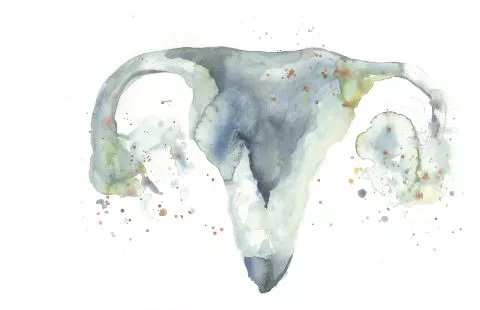What is PMS?
Most women I have worked with over the years “know” when their period is coming. Some experience a change in their mood, have bloating or sore breasts, develop acne, have abdominal cramping, or a change in their bowels. Some unfortunate women have all of these things, and more.
Today it is estimated that 3 out of every 4 menstruating women will experience at least once in their lives some form of physical or emotional changes after ovulation happens until the menses begins, a condition known as Premenstrual Syndrome (PMS).
For a long time in modern medical theory, there was a question of whether PMS was just “all in a woman’s head”. However, after considerable conversation and controversy, a category for women with life-affecting symptoms of the disorder was created in the Diagnostic & Statistical Manual (DSM) used by mental health professionals.
Considered to be a more severe form of PMS, Premenstrual Dysphoric Disorder (PMDD) may be diagnosed if most of a woman’s menstrual cycles in the last year had at least 5 of these symptoms:
- Marked lability (mood swings)
- Marked irritability or anger
- Markedly depressed mood
- Marked anxiety & tension
- Decreased interest in usual activities
- Difficulty in concentration
- Lethargy or marked lack of energy
- Marked change in appetite (overeating or food cravings)
- Hypersomnia or insomnia (change in sleep)
- Feeling overwhelmed or out of control
- Physical Symptoms (ex. bloating, muscle pain, weight gain, breast tenderness)
The cause of these symptoms are not very well understood in biomedicine. Some theories exist, but clinical trials have not produced strong enough evidence to support them.
Progesterone deficiency or estrogen dominance are perhaps the most assumed mechanisms, yet many studies show no significant difference in progesterone levels between PMS groups and control groups.
Depending on the severity of symptoms, medications are sometimes used to treat premenstrual symptoms. Antidepressants, anti-inflammatory drugs, diuretics, and hormonal contraceptives which prevent ovulation are the most common prescriptions.
PMS in Traditional Chinese Medicine
In Traditional Chinese Medicine (TCM) theory, emotional and physical health are dependant on the unfettered circulation of blood and energy throughout the body.
Factors that disrupt this flow can result in the manifestation of unwanted symptoms.
Premenstrual syndrome can be explained as an “unsmooth” circulation in the body.
The severity of the symptoms corresponds with how disrupted the flow has become, and what the underlying causes are. Sometimes there is too much of something, which blocks the circulation; sometimes there is not enough of something, which leaves the body too deficient for adequate flow.
Some examples of this disruption are:
Emotional Strain
The power of emotions over our mind-body connection is well established in Chinese Medicine theory. Resentment, frustration, and anger can be the cause of (and the result of) unsmooth circulation.
Strong emotions can unsettle our smooth circulation in two main ways;
1 ) the disruption of the hypothalamus – pituitary – ovarian axis (HPO Axis) in a “top-down” direction,
or 2) chronic activation of the sympathetic branch of the autonomic nervous system (the “fight, flight or freeze” response).
When emotions or stress alter the circulation of blood & energy in the body, it is referred to as Liver Qi Stagnation in TCM theory.
Diet
Eating certain foods in excessive amounts, especially greasy foods and dairy products, can end up “clogging” the body with phlegm, negatively affecting its circulation.
These accumulations can result in the physical symptoms associated with PMS, such as sore, swollen breasts, or abdominal bloating.
If phlegm is present when there is also Liver Qi Stagnation, it may develop in phlegm-fire, which can lead to the more severe symptoms of PMDD such as extreme emotional disturbances and mental changes as the mind’s “clear orifices” are obstructed.
Overwork or excessive sexual activity
Extended periods of intense work, school, exercise or sexual activity can leave the body depleted over time, which may result in a Chinese Medicine pattern of Deficient Yin or Deficient Blood.
If these important substances in the body are diminished then Liver Qi may become stagnant, resulting in unsmooth circulation.
Treatment of PMS in Traditional Chinese Medicine
Once the underlying causes for unsmooth circulation are determined for a woman suffering from PMS or PMDD, treatment can begin.
Regular acupuncture treatments can be very helpful for optimizing the circulation of blood and energy, both directly by using meridian theory to influence flow, and indirectly by reducing the body’s sympathetic nervous system response.
Regular exercise, yoga, meditation, intentional relaxing, and spending time in nature are great ways in addition to acupuncture to increase circulation and counter the body’s stress response.
Chinese Herbal Medicine is another powerful way to optimize the circulation of blood and energy in the body. This can be especially helpful if there are pathogens, such as phlegm or phlegm-fire, to be cleared or if there are deficiencies to be supplemented, such as Yin or Blood.
One very popular herbal formula, called Xiao Yao San or “Free & Easy Wanderer”, is widely used to help treat PMS through its effects of increasing circulation, strengthening digestion, and nourishing blood. It can be modified to also clear phlegm & fire or nourish Yin as needed.
Other Natural Solutions
Our custom Yinstill ‘BALANCE’ supplement also helps many with restoring normal hormonal function. This formula works to optimize liver health.
Our MIC+ acupoint injections provide various vitamins, amino acids, and other substances to soothe the symptoms associated with PMS, enhance mood, and support optimal digestion.
Doctor of TCM
If you would like to talk about your PMS symptoms and see if TCM treatment can help you alleviate them contact us today.
Yinstill offers free 15 minute phone consults to help answer any questions you may have.
References
Maciocia, G. (1998). Obstetrics & Gynecology in Chinese Medicine. Edinburgh, OK. Elsevier.
https://www.mayoclinic.org/diseases-conditions/premenstrual-syndrome/symptoms-causes/syc-20376780


